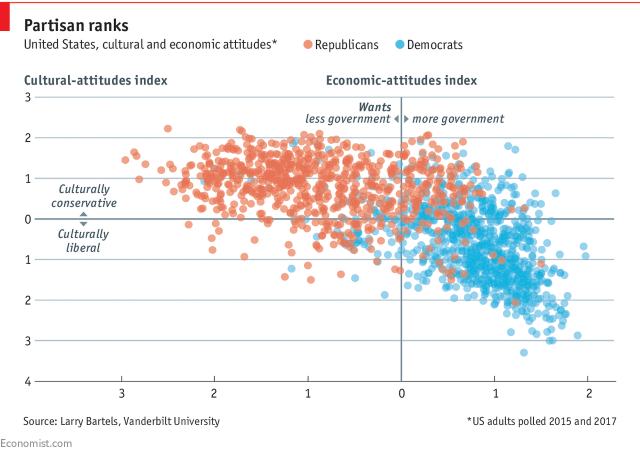The party turned Trumpy before the 2016 election, not after

DONALD TRUMP is not a traditional Republican. His breaks with the party’s orthodoxy on several issues, and above all on free trade, have caused many Republican officials and conservative intellectuals to denounce his leadership. But although most party officials have embraced the president only half-heartedly, Republican voters seem to have far fewer reservations.
YouGov, a pollster, interviewed a group of 2,000 American adults twice: once in 2015, and again in 2017. Respondents were asked about their attitudes on cultural issues, such as whether or not discrimination against whites was as big a problem as discrimination against racial minorities, and on economic issues, such as whether or not the government should work to reduce income inequality. Larry Bartels, a political scientist at Vanderbilt University, has analysed the results and come up with two firm conclusions about the modern Republican Party.
First, he finds that Republican voters are much more unified on cultural issues than Democrats are, but less unified on economic questions. This helps explain why many Republicans are not too bothered by Mr Trump’s idiosyncratic economic views. Moreover, Republican respondents feel much more positively about Mr Trump than they do about many Republican leaders with more conventional positions, such as Paul Ryan, the outgoing speaker of the House, or Mitch McConnell, the Senate majority leader.
Second, few voters seem to have changed party affiliations since Mr Trump took office. Only 3.9% of Democrats and 5.2% of Republicans switched to the rival party. To the extent that there has been a major political realignment in America, it likely happened during Barack Obama’s presidency. Data from the Pew Research Centre, a think-tank, show that white Americans with only high-school degrees were evenly split between the Democratic and Republican parties in 2008, but have since migrated to the GOP en masse. By 2015, this group favoured Republicans over Democrats by a margin of 24 percentage points.
Pundits often claim that Mr Trump has remade the Republican Party in his image. Mr Bartels, however, thinks this hypothesis is overblown. Instead, he argues that political analysts tend to overestimate the importance of policy in politics, and underestimate the importance of tribalism.
source: https://www.economist.com/blogs/graphicdetail/2018/04/daily-chart-8

Hi! I am a robot. I just upvoted you! I found similar content that readers might be interested in:
https://www.economist.com/blogs/graphicdetail/2018/04/daily-chart-8
Downvoting a post can decrease pending rewards and make it less visible. Common reasons:
Submit